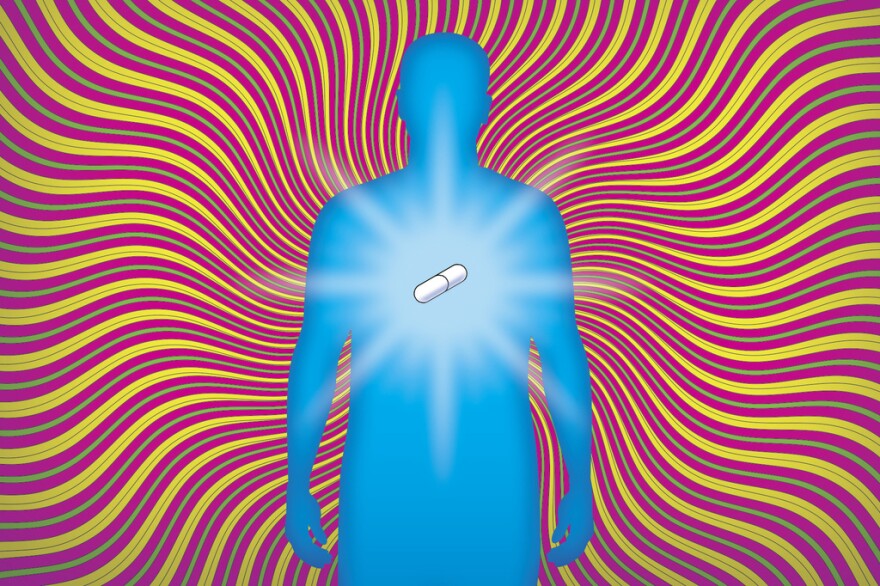In spring of 2020, when Seattle was at the epicenter of the emerging COVID-19 pandemic, Rachel Drayer was a physician assistant in emergency medicine at Kaiser Permanente.
Her memories from that period are dominated by helplessness and fear: people dying in isolation, patients getting X-rays through glass doors – all while wondering whether she could be the next one on a ventilator.
“What sticks with me is just trying every day to go into work and be afraid of dying,” says Drayer, who now runs a clinic in Wenatchee, Washington. “I was seeing people who were my age who looked otherwise healthy, who were just like me, getting profoundly sick and dying. I didn't have any reason to suspect that I would be any different if I caught it.”
She describes feeling overwhelmed and exhausted by those first waves of the pandemic. Then, once vaccines became available and outcomes started improving, a whole new phase of the crisis began for healthcare workers: the backlash.
“People coming in peddling conspiracy theories, blaming us, targeting us. That was more hurtful and more terrifying than the pandemic itself,” Drayer said.
When she wasn’t at work, Drayer, ordinarily an active, outdoorsy type who loves to hike and play guitar, found herself confronting despair.
“I would just sit in the bottom of the shower and just stare at the wall, unable to engage,” she said. “I just felt so sad all the time. And that's just not me.”
A generation of health workers, traumatized
Drayer is not alone. Studies have found as many as 43% of COVID-era clinicians showed signs of major depression, and one in three had symptoms of post-traumatic stress disorder (PTSD).
University of Washington oncologist and palliative care specialist Anthony Back saw firsthand how his peers were struggling, even years after those chaotic early waves.
“The kinds of comments I heard were things like – and this is a direct quote – ‘I feel more disposable than a used COVID swab.’ A number of people said to me, ‘I just feel like a robot at work. I go in, I hear myself say the right words, but I don't feel anything.”
The kind of hopelessness he saw led Back to think about work he had done previously with patients who have a terminal diagnosis. That included studies into how those people might benefit from the emerging field of psychedelic-assisted therapy.
Psychedelic drugs such as so-called "magic mushrooms," LSD and MDMA are Schedule 1 controlled substances and research on them is relatively new, but some of the first mainstream studies of these drugs showed they can provide relief to patients confronting death.
Back wondered: “Is there some kind of match between what psychedelics can do with uncertainty and dying and existential despair, and the situation of clinicians?”
Back would go on to design a clinical trial for frontline COVID health workers with depression, burnout and PTSD. Half the subjects would get psilocybin – the active chemical in magic mushrooms – and the other half would get a placebo.
There was room for 30 participants. More than 2,000 people applied.
‘Very Alice in Wonderland’
One of those participants was Rachel Drayer. She described going in, after a session of preparatory counseling, to get her medicine. She was led to a table that was laid out for tea.
“It was very Alice in Wonderland,” Drayer said. “There was one capsule in a small dish on a tray. And I just took the pill and then we thought … okay!”
Drayer said she nestled into the cozy bed that had been laid out for her, attended by two trained guides, including Back. She put on headphones and an eye mask, and settled in for what turned out to be a five-hour journey.
“It was an experience unlike anything I've ever had, and I think if I walked you through it, it would sound crazy,” Drayer said. “There were parts of it that very much linked to my childhood. There were parts that were scary and made me question who I was at my core.”
Drayer said Back and the other guide helped her through the scary parts, as well as keeping tabs on her vital signs. She recalled one occasion when Back gently stirred her to take a blood pressure reading, briefly interrupting her communion with some flecks of light she could only describe as alive.
“They were almost like little fairies or creatures,” Drayer said of the beings she remembers seeing. “And I remember them saying to me, ‘tell Dr. Back it's OK to take your blood pressure. We can wait while he does what he needs to do for this study.’ So, I remember saying, ‘hey, they want you to know it's OK,’ and him saying, ‘tell them thank you.’”
At the end of the trip, Drayer described feeling a profound sense of comfort and clarity – like she had processed years' worth of struggle in five hours.
“My journey was almost like an opening of a book, a turning of pages, and a closing of a book. I remember at the end, it sort of faded to black, like the curtains closing on a play, and I remember sitting up saying, ‘I'm done.’ Like, the book is closed. I know exactly what I'm supposed to be doing in this world. I know who I am.”
The awakening was so quick and so profound, Drayer said, that she almost felt as if she’d “cheated,” by unloading so much of her COVID-era baggage at once.
“I just short-circuited all that stuff,” she said. “I didn't ignore it. I didn't push it down. It's just – it's just moved through.”
What psilocybin does in the brain
Scientists are still working to understand exactly what the drugs are actually doing. Back said the evidence suggests they increase the brain’s resilience – reawakening its ability to lay down new neural pathways and overwrite unhealthy patterns.
Back said the process is a bit like reactivating the sponge-like learning of childhood, in a way we can rarely access as adults.
“Psilocybin allows you to step back and open up a kind of new learning period,” he said. “A scientist friend of mine says, you know that thing about how you can't teach an old dog new tricks? Well, with psilocybin, you can.”
For his study, funded primarily by the Steven and Alexandra Cohen Foundation, Back’s team randomly assigned participants to receive either psilocybin or a placebo. They then assessed the participants’ symptoms before and after therapy, using a standardized numerical scale.
On the Montgomery-Asberg Depression Rating Scale (MADRS) scale, 1 equals “no depression” and 35 is “severe depression.” People who got the placebo improved somewhat – about 9 points on the scale.
Those who got psilocybin improved by much more – about 24 points, on average. Back said even a casual observer would definitely notice that much progress.
“It's a pretty dramatic change and it happens really quickly,” Back says. “People are going from a moderate level of symptoms of depression to almost normal.”
The analysis also showed improvements in PTSD and burnout symptoms, which fell short of statistical significance.
Independent experts say the UW results are consistent with psychedelics research in other populations.
“Given all the other evidence that we have from other clinical trials, [these results] seem to be very in line with what we're seeing elsewhere: that there's something there,” said Stacey Armstrong, a senior researcher in psychedelics at Ohio State University.
While this study is promising, Armstrong said, it is based on a small sample size.
“I would like to see a larger trial with more participants,” Armstrong said.
Psilocybin is a complex and expensive drug to study, given its legal status, and it’s not unusual for these studies to be small. But Armstrong and Back agree that it needs to be followed up with larger trials over longer periods of time.
A lasting change for the better
For participants in the UW study, written up in the journal JAMA Network Open, the results have been relatively durable: Drops in depression scores showed up consistently up to six months after treatment.
Rachel Drayer is a year out at this point, and said her old thought patterns feel distant now.
“The way my body feels, it’s almost like I don't quite understand how to feel anxious anymore. Like, it doesn't really register,” she said. “I have this much deeper sensation and understanding of what's important, and I find that I just don't feel obliged to do the things that are not.”
Among other things, the research has demonstrated there is widespread interest in this new therapy from a cohort of health workers still struggling under the weight of COVID-era trauma.
At the end of the study, participants who had gotten the placebo were given the opportunity to retake the therapy with actual psilocybin. Almost all of them chose to try the real thing.







